Outtakes: Al Horford on picking the Celtics, Brad Stevens on Twitter and more
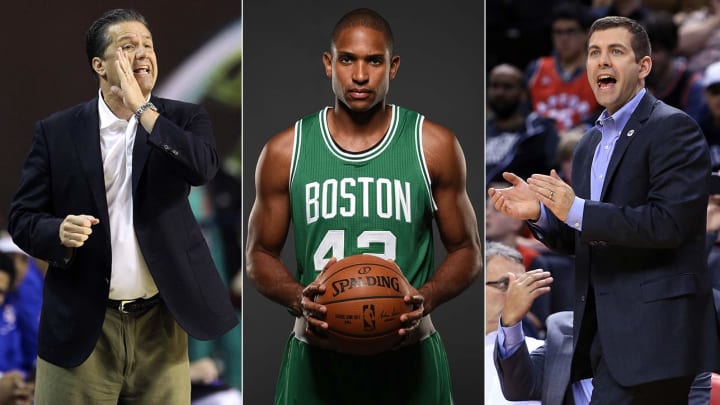
Over the course of two weeks in mid-September, I spent some time talking to Al Horford and various people around basketball for a profile that appears in this week's Sports Illustrated. I loved reporting it. Horford's story pulls in threads from all corners of hoops. Beyond talking to Horford himself about his culture, his kinship with David Ortiz, and the future in Boston, it also meant talking to John Calipari about coaching the Dominican national team, Tito Horford about his role in Dominican basketball, Karl-Anthony Towns about his relationship with Horford, and Brad Stevens about the Celtics' work this summer.
Much of what they said couldn't fit in the magazine, but that's what the internet is for! With that mind, here are some of the stories that were left on the cutting room floor. We'll do this oral history-style to keep things simple.
Why Horford went to Boston
Al Horford: "I'd been [in Atlanta] nine years. So for me to leave the situation and everything here, it was going to take a very special place for me to do that. When I look at the Boston team, the guys we have, a lot of younger guys, I just see a lot of potential."
"I got to play against them a lot last season, and I was just very impressed with how hard they play. Their commitment to wanting to do the right things and play the right way. As the process kept going and it started to become a little more real, I felt like it was a possibility to be part of that. I felt that it was going to be a good fit for me. To be able to come in and just start building, and see how good we can be."
"I know they're very passionate up there. It's a little more intense. They're all about their teams up there. I have a lot of respect obviously for the organization and what they do, and that was definitely important for me."
The Godfather Part II: Al Horford looks to carry on tradition in Boston
"I've known Kevin [Durant] over the years, I spoke to him a couple times here and there. But when I made my decision, I didn't know what was going on and what was going to happen with him. I was trying to decide for myself, between Washington and Atlanta and Boston."
"[Brad Stevens] was important. The ability to make decisions in his offense, and the way that he portrayed everything, definitely attracted me."
"Amir Johnson came down to Atlanta to work out with me earlier this summer. That meant a lot to me. We got together, started working out a little bit. RJ Hunter was around as well. I saw Jae Crowder, he came down and worked out one day, too. I've seen Kelly and Isaiah here and there. But now I'm looking forward to all of us getting together to start building."
Tito Horford: "I think he and his family chose to leave because maybe he wanted to experience a new horizon. He never had any conflict with the Hawks, or the players, or the city. He made his home in Atlanta. He loves Atlanta. He just wanted to try to something different. And playing for the Celtics, that's something every kid wanted to do. They had a great background, history."
"As a father, I'm very proud. He's happy, his wife is happy. That's the most important thing right now. He chose a great team. A great city. You know Boston, they're very passionate about every sport. I was happy for him. Whatever he decided to do, I was going to support him. As a father, that's my job."
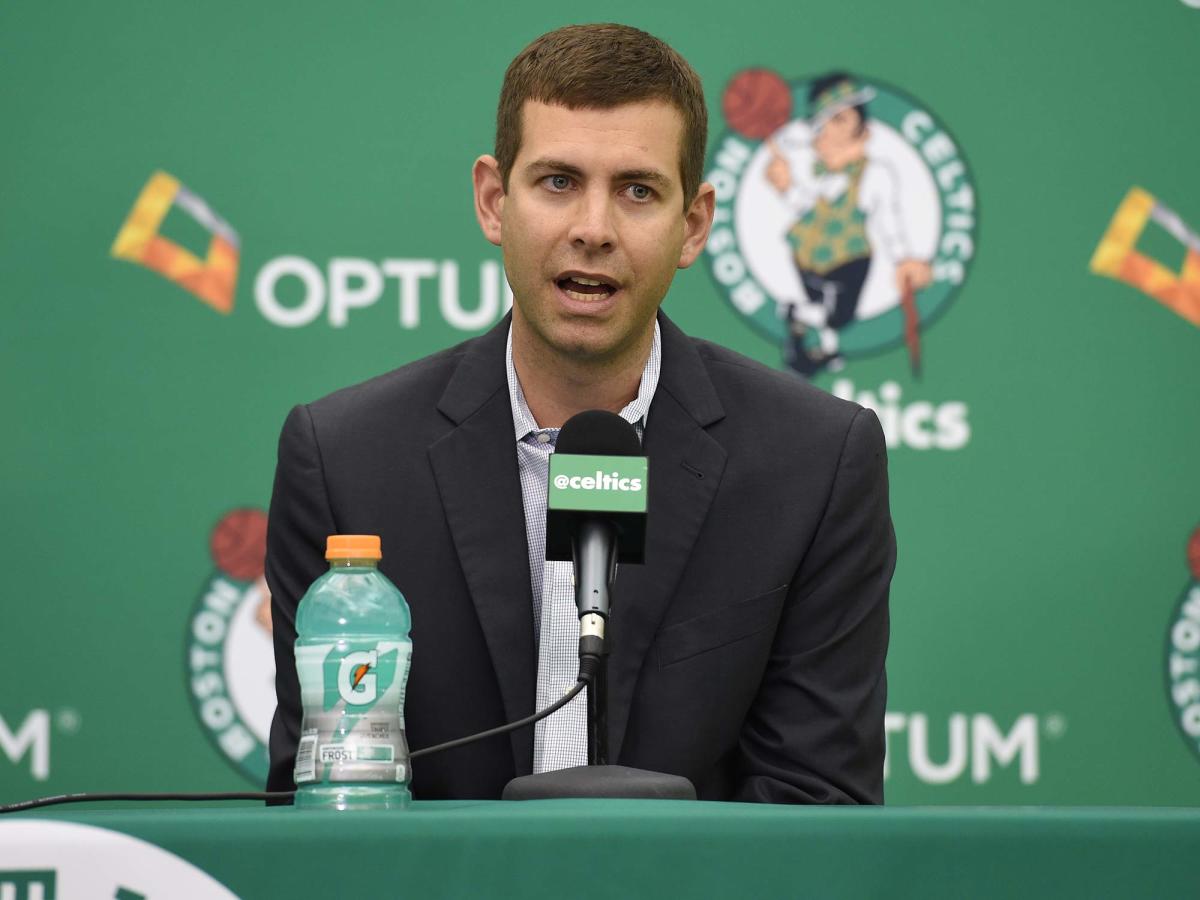
Brad Stevens on pitching Horford
Brad Stevens: "First of all, I had a great deal of respect for him as a player, but also the organization he was playing for, and Coach Budenholzer. I thought that he's a guy that does so many good things on the floor. He makes his teammates better."
"I think he'd thrive as a player in a lot of systems. But we do like to play through our bigs quite a bit, and obviously, him passing the ball, handling the ball, scoring the ball the way that he does, that's a real fit for our system. So we showed him that at our meeting. And then we talked about defensively, in an ideal world, we'd have the ability to guard multiple positions and fly around."
"You want to sell your tradition and history, but at the end of the day that matters somewhat, but that's part of the environment. The fans and all that stuff. The bigger sell is, this is how we're going to play. This is how we see you being a part of how we play. And then, these are all the things that Boston has available to help you and your family to make this transition smoother."
"I think there may have been [Durant] talk, but we wanted Al for Al, and we wanted to make that very clear."
Al Horford needed a car on his wedding night, so David Ortiz lent his Rolls-Royce
"I think the chief message from the players [at the meeting] was just what it's like to play here. The idea that there is such a positive vibe throughout this process, where we're all trying to grow and get better. There's a real connected-ness, a sense of purpose. I think our players are passionate about being that, and I think we were pretty good at being that last year. Certainly we had our moments. Hopefully we just keep making progress."
"I think that was something ... [Leaving a great situation with the Hawks and moving his family to Boston, just as Stevens left Butler] ... That's a hard thing to do. Especially when you've been in one spot for a long time. I did hit on the fact that I experienced a level of being uncomfortable, and it turned into a really good decision for us, for my family. I've really grown as a coach. But it was really hard to do. And I think you can empathize with that a little bit."
"But this place speaks for itself. How much there is to do, the history, the fans. He's got a young family, he's got a two year-old, another on the way. It's a great place to raise kids. The education is tremendous. There's just so many things about it. And hey, you can get that in a lot of different places, I understand. But I don't think Boston takes a backseat to anyone."
Brad Stevens on what constitutes Celtics success this year
[Note: this answer is elite coachspeak.]
Stevens: "Just getting better every day. I don't get into the numbers, or where you're at the end of the year. I think it's very clear that Cleveland has established themselves as the dominant team in the East. We weren't able to catch Toronto last year. We were in a four-way tie for third. There were two, three, maybe four teams that were a few games behind that clump at third. I think this season can go any which way, so we gotta play well. I tell our team every year, the best part about training camp is that everybody's excited about the new season. None of the 30 coaches are saying, 'Ugh, I don't think we're very good.' Nobody says that. They talk about their young players, they talk about new combinations and everything else, but eventually this is all gonna yield to reality. So we'll find out how good we are."
Brad Stevens on Twitter
Stevens: "I didn't know [about Danny Ainge's KD sneakers]. I didn't even see the pictures. I don't have Twitter on my phone anymore. I've got it on the iPad. I check it maybe once a day. It's kind of liberating, to be honest. It's great."
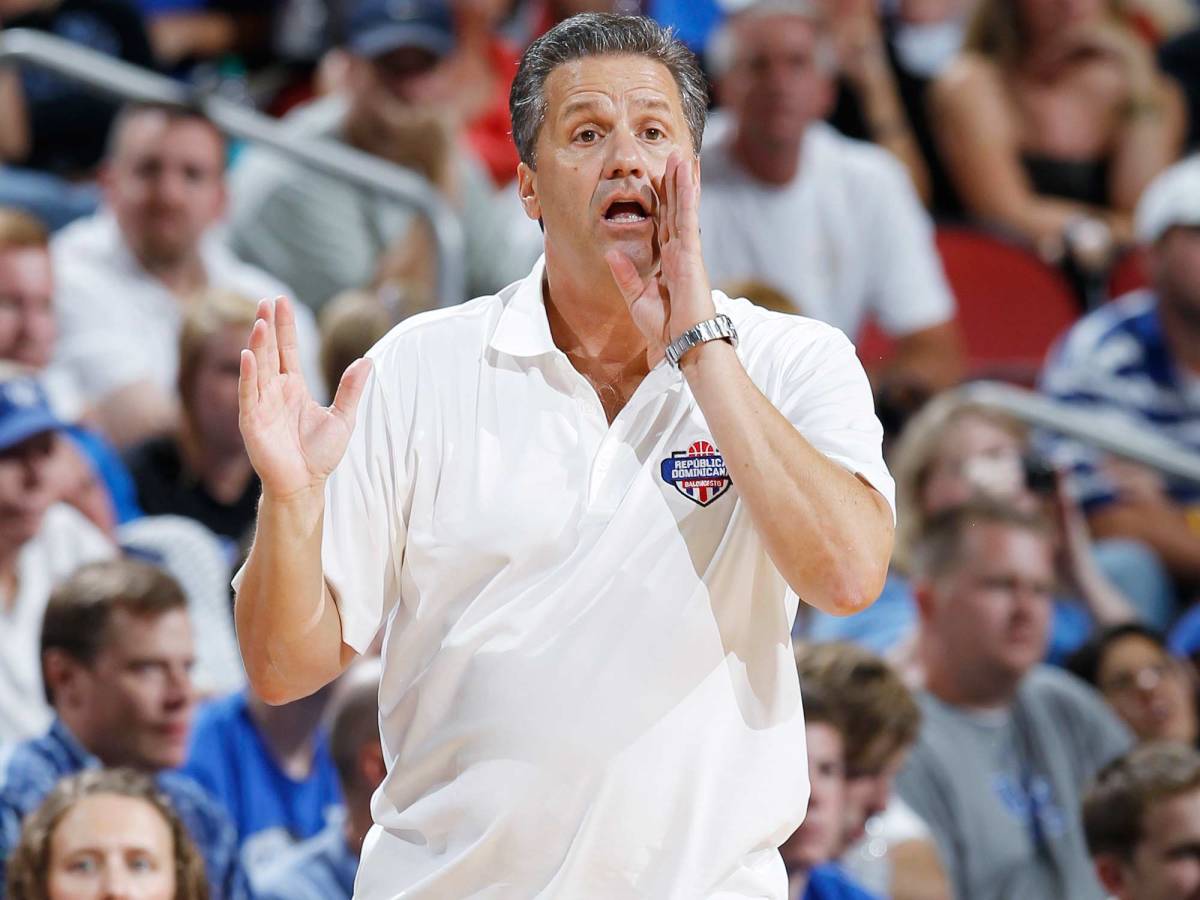
Why Calipari said yes to Domincan team
John Calipari: "They approached me about coaching their national team. I had [Dominican born] Orlando Antigua on my staff. So they went through Orlando, who played at Pitt, played at St. Raymond's High School in New York City, was part of the Globetrotters, and then was on my staff. They were approaching him. 'Can you get Cal? Can you meet with him? Can we sit down with him?' So they came and met with me. I said no the first couple times. It was going to be five, six, seven, eight weeks of my time."
"Knowing that it was a baseball country, that everything was about baseball there, I said 'Look, I will do this if you are going to tell me it's bigger than just coaching your national team. Are we going to get the young kids started? Are we going to get the 14-15-16s going? Is there going to be women? Tell me what we're going to do, because I don't want to just coach your national team. That doesn't do anything for me. It doesn't move my boat.'"
"Al was a big part of it. You're never going to overtake baseball. You just won't. It's kind of like football in the south. You can have really good basketball, but you're just not going to overtake football. But it doesn't mean you can't do both. And that was my point."
"They're now in the rankings, world rankings. They're top 20. I mean, it's ridiculous. And if you ask them, their 15s are doing good, their 18s are doing good, their women were in the world championships. Things that have never happened before. That was the whole idea."
"Now, you have people that say, 'Why would Cal do this?' That's why I did it."
"As time consuming as it was, I took out more than I was given. As a coach. I think the next year [after qualifying in 2011] we won the national title."
"Then they said, 'Well he did it to get Karl Towns.' Well, great. It wasn't true. If you talk to Karl, he'll tell you I didn't even know who he was."
"Now, let me say this now... When I found out who he was, and I happened to watch him play, I told the Federation you need him within this group. Whether we gotta bring a guy like that and have him be the 12th or 13th man on the team, for the future, you need to do that. Which is what we did. He barely played, but he practiced, he traveled, he became part of the federation. Now if he plays, he's one of their best players. That's why we did it."
"Him and his family, knowing what we had done with DeMarcus, with Anthony, you knew he was going to want to play here [at Kentucky]. But I didn't even know who the kid was. He was in eighth grade for God's sake. Eighth grade, going into ninth."
Calipari explains Karl-Anthony Towns
Calipari: "There were better players. USA basketball players in his age group, wayyyyyyyy better. Karl Towns, even in the McDonalds game, he was the 8th or 9th rated player. And all of the sudden he sat in the post, learned to play pick-and-roll defense, block shots, make free throws, build his confidence next to the basket. And not only the number one pick... Rookie of the Year going away?"
"None of us saw him playing the way he's playing now. The whole thing was, 'Is he going to accept what the best version of him looks like?' Every kid comes in here, and every kid I come in contact with, I'll watch, and then you get a mental picture of him at his best."
"Well, some of the kids argue the point. Sometimes what I'm asking them to do is really difficult. They'd rather just have the ball and shoot more. Shoot more threes, hit a couple jumpers, I'll defend every fifth time down [the court]. What we're asking him to do is really hard, and he has to own the picture. He wanted that picture. He was even driven more than I realized in this regard."
"I've had others that while I'm over top of them, they do everything we're asking. They try to be the version of themselves we're trying to get them to be. But the minute they leave, they're like, that's too hard. I'm not willing to... Those habits are not mine. And those are the kids, they're on the edge of making it or not making it. Karl, when you gave it to him, he owned it. It was his."
"When it came down to Minnesota or L.A., I knew he was going to be the No. 1 pick. I talked to Flip [Saunders]. I knew all along. If anybody passed on him, they were nuts. But then, I said to him at one point, 'You know, being in L.A. wouldn't be so bad now... I mean, let's be real here.'"
"He looked at me and he said, "Coach, I will wear two jackets. I'm going to be the No. 1 pick." That's what was in him. That's what you don't know. That piece was the one."
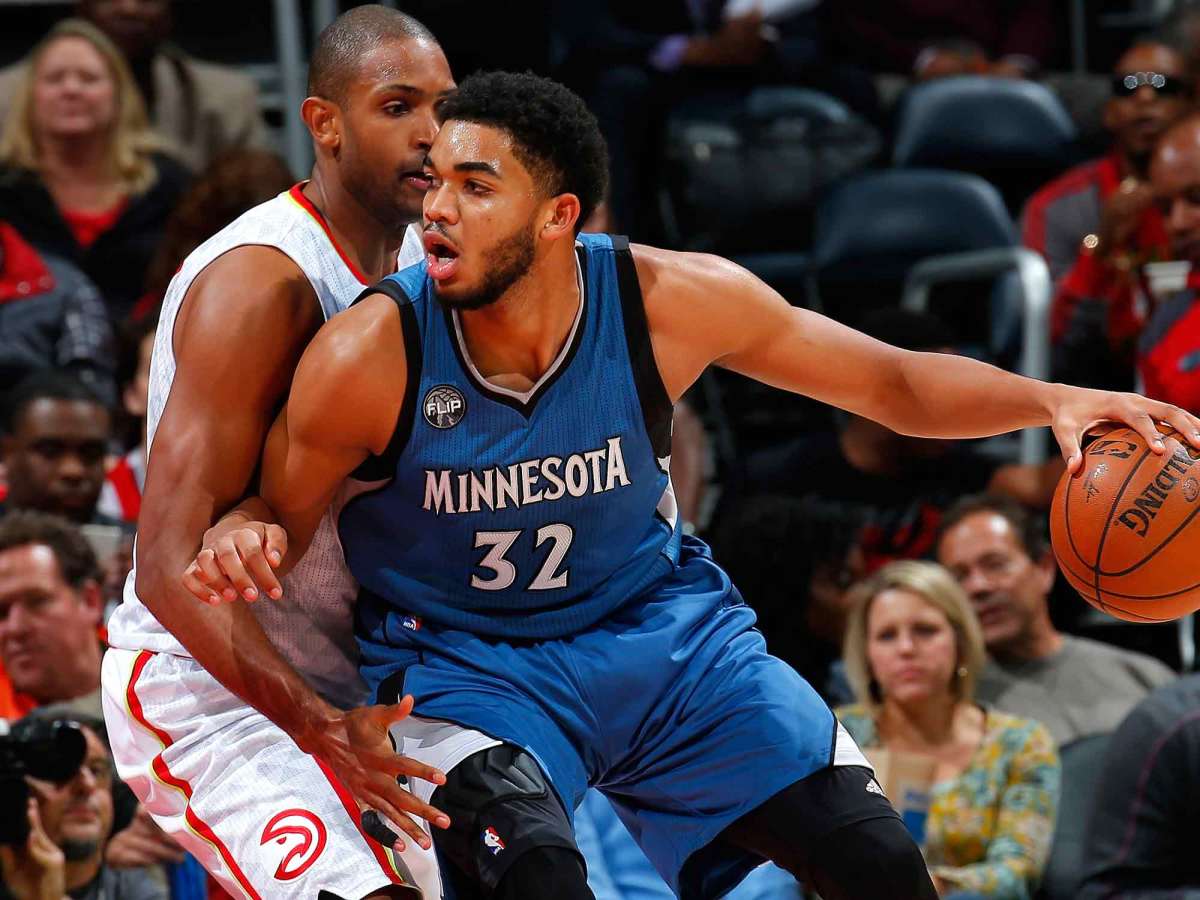
Horford family on watching Towns as a teenager
Tito Horford: "He was 13, 14 years old. And I knew this kid was going to be an NBA player. I stopped him said, 'Someday you're going to be in the league. It's going to take some time, but you've got the potential. The most important thing right now is to keep working hard and keep your focus. And listen to Al. Because he can help you, he can advise you. But you need to do your part.'"
The world (and the Wizards) according to Marcin Gortat
Al Horford: "I met him when I was 14. I've seen him grow and develop, and he has a great support system around him. His dad and his mom are great people. And they've done a really good job with him, making sure he stays on the right path. For me, he's always been so mature I haven't had to say much. He was always his own person, making his own decisions. Maybe he was looking at me from afar, but I feel like he's always had the right mindset."
"He's way ahead of where I was at that time. [Against Team USA at 16 years old] he was just excited! He wasn't even scared. He was confident, he went out there and played, and he played well."
KAT on watching Horford
Karl-Anthony Towns: "I was not afraid to go out there and not make [the national team roster]. I was OK if I wasn't good enough. I just wanted to go out there and play against the best. I was playing really well, I think I showed a lot of promise, and they took a chance on me. And I think they look back now and say they made the right decision."
"Just seeing how much more [his professional Dominican teammates] do than the average player, seeing how much time they put in. Especially having a mentor like Al Horford, seeing the extra reps he takes, what he does to take care of his body. Little things that make a difference, that a teenager at the time, me in high school, never did. I was just playing off of pure talent. It was something I've implemented into the way I play and treat the game. That's a testament to him."
"Funny enough, growing up, I was a huge Florida Gators fan. Huuuuuuuuuge Florida Gators fan. I always wanted to be a Florida Gator. You know Corey Brewer, Joakim Noah, and the national titles together. And I wanted to be the next Al Horford."
"And I told Al that, to his face. I wanted to go to Florida, have that prestigious career. [Laughing] It was just amazing that, you know, comes time to commit, and I don't go to Florida. So I know to Al that was a punch in the gut."
"No, he never gave me any grief. But I did call him after both Florida games this year."
Towns and Horford explain Dominican culture
Horford: "People that have a lot of pride. People that are very caring. People that really love their culture, their food, and their country."
Towns: "Obviously the food. Everyone knows about the food. The culture is so rich and pure. It's so unique. A lot of laughter, a lot of jokes, very loose people. My family especially is all jokesters, and it resembles my personality. It comes from my Dominican side."
Horford: "I saw my dad play for the Dominican National Team. All my life, growing up, it's something I've always wanted to do. And it was always a dream of mine to do it. And when I've had the opportunities I've done it with a lot of pride. Very grateful, and trying to elevate basketball to make the most of the situation over there."
SI.com's Top 100 NBA players of 2017
Towns: "I was going to be a baseball player. [Laughing] I've always wanted to hit like David Ortiz, or field like Albert Pujols. But once I got on the Dominican team, I really took notice of Dominicans more closely, and just realized how much talent our country has developed. It's a huge honor to even be mentioned in a group like that now. I can remember the days I was that scrawny, 15 going on 16 year old, just trying to make the team."
[Reminded that since he played internationally before his 18th birthday, Towns is technically still eligible to play for either the U.S. or the Dominican Republic] "You know what, at this moment, D.R. is where my heart's at. If we were to go to the Olympics or World Championships, you'd definitely be seeing me wearing a Dominican jersey."
Tito Horford on Dominican basketball progress
Tito: "I knew it would develop. Once you open the door for the Dominican kids—for kids like Charlie Villanueva, Felipe Lopez, Francisco Garcia, my son, now Karl-Anthony Towns—all those kids got to watch me play. Every time they see me, they reach out to me. They really appreciate it. Now you see the Dominican Republic with other players overseas, in college. It keeps growing. We'll probably never have as many NBA players as baseball players, but we've got a few now, and they're going to be keeping kids motivated."
"[Al] established himself in the NBA, a 4-time All-Star. And I think for younger generations, he's going to be remembered for a long time. Every kid in the Dominican Republic, they look up to him, they watch the NBA. They want to see Al Horford, they want to see Karl-Anthony Towns. They see those two players, and they focus on someday reaching the same level."
